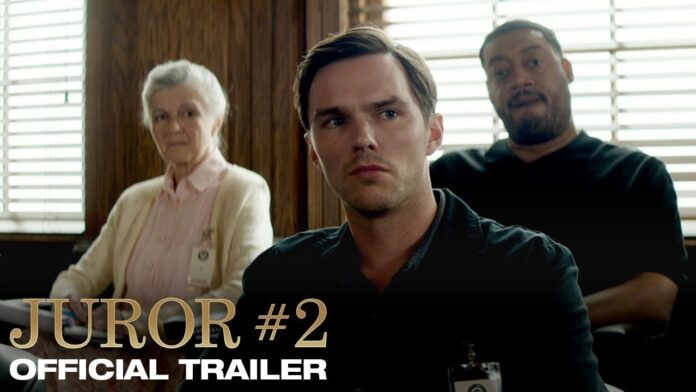Veteran director Clint Eastwood explores the nuances of accountability and truth in his latest, star-studded legal thriller.
In Juror #2, Clint Eastwood, who at 94 shows no signs of slowing down, brings audiences a tense courtroom drama that probes the heart of justice, truth, and morality. Known for decades as the face of stoic masculinity, Eastwood once again steps behind the camera, delivering his signature approach to storytelling—a steady hand, classic structure, and a thought-provoking exploration of old-fashioned ideals. The film places modern questions of justice under the microscope, turning an ordinary case into an examination of moral ambiguity and accountability.
Nicholas Hoult stars as Justin Kemp, a Savannah, Georgia, native who, like many, would rather skip jury duty, especially with a high-risk pregnancy at home. His wife, Allison, played by Zoey Deutch, is in the final weeks of her pregnancy, and he wants to stay close to support her. But civic responsibility wins out when he’s selected as a juror for a serious domestic violence case. The trial centres around a young woman found dead after an argument with her boyfriend, played by Gabriel Basso. As Kemp, Hoult is a reluctant but conscientious juror, finding himself caught between evidence, biases, and a looming sense of moral duty that gradually consumes him.
The case unfolds with a chilling simplicity. The deceased had argued with her boyfriend at a roadhouse bar on a rainy night. Witnesses saw him angrily smash a beer bottle, after which she stormed off into the night. By morning, her body was found in a nearby creek, leading the prosecutor, Faith Killebrew (Toni Collette), to suspect foul play. Killebrew, running for district attorney with a platform that prioritises protecting women, sees this case as more than a trial—it’s a political opportunity. Her prosecution argues that the boyfriend’s history of violence makes him a clear-cut aggressor, leaving the public defender, Eric Resnick (Chris Messina), to challenge this narrative. He raises an alternative theory: what if she slipped on the wet roads and fell?
Each character faces personal stakes, lending the courtroom drama a complexity that goes beyond its plot. Toni Collette’s Faith Killebrew fights not just for a verdict but for her career, threading her role with determination and occasional ruthlessness. On the defence side, Chris Messina’s Resnick embodies a different kind of resilience, determined to challenge the assumptions against his client despite mounting evidence. Gabriel Basso’s portrayal of the accused injects ambiguity, making the audience question the simplicity of “good vs. evil” while Francesca Eastwood, as the ill-fated girlfriend, subtly haunts the narrative.
The film doesn’t shy away from classic courtroom tension but also invites viewers to consider broader questions. It interrogates how justice and truth sometimes diverge, the complex role of personal biases, and the limits of legal accountability. Eastwood’s directing, driven by his fondness for old-school moral dilemmas, infuses Juror #2 with a gravitas that connects audiences to the narrative beyond the screen. It’s a film that balances suspense with a pressing sense of introspection, pushing Justin Kemp to confront uncomfortable truths—not only about the trial but about his own beliefs.
Eastwood’s career has long been characterised by films that blend action with questions of ethics and justice. His recent works, including Richard Jewell and The Mule, are proof of a director unwilling to let age define his storytelling. With Juror #2, he leans into the courtroom genre with confidence, relying on taut pacing and resonant themes, much like the dramas of a previous era. The result is a film that reflects Eastwood’s commitment to timeless storytelling while tackling pressing contemporary issues.
As Eastwood pushes forward, so does the tension within the film. The narrative not only scrutinises the defendant but also examines the unseen pressures that each character carries. For Kemp, the experience reshapes his sense of duty and perspective, illustrating how trials don’t only judge those in the dock but change those on the jury, too. Eastwood’s direction deftly captures this evolution, making Juror #2 a fitting addition to his extensive filmography of complex, conscience-driven characters.
